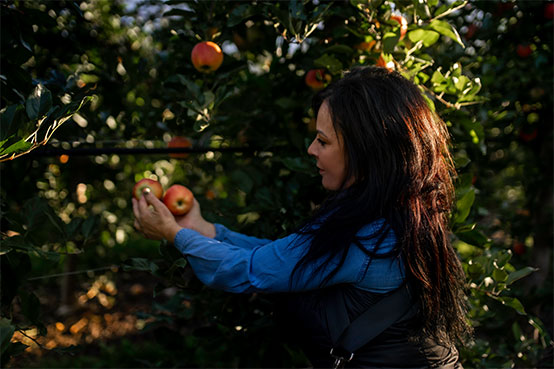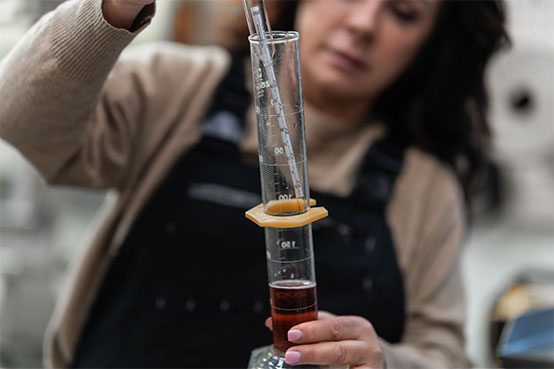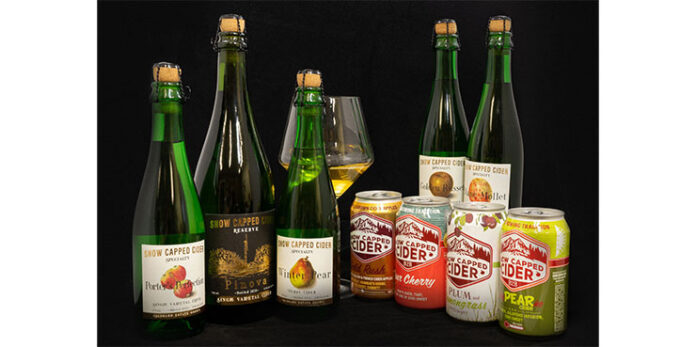With only 25% of executive roles held by women in the beverage industry, Kari Williams’ journey from a rich family legacy in orchards, dating back to the 1800s, to pioneering Snow Capped Cider, offers valuable insights into overcoming gender imbalances in the field.
Snow Capped Cider is a hard cider brand featuring flavors ranging from Colorado Peach to JalaPEARno to Sour Cherry and everything in between. Each can boasts a 6.9% ABV. Many of the flavors have even won awards, including Best in Class, Double Gold, Silver and Bronze, just to name a few.
Over the years, Williams has helped contribute to her family’s 6130′ elevation orchards and vineyards, which are now over 500 acres. The many decades of commercial fruit growing and packing provided her with the knowledge and experience to make even more out of the family business.
“We never intended on being an alcohol company,” says Williams. “Our lives are centered around fruit growing, but my husband and I wanted to make cider just for fun. We didn’t think we would sell it, and my husband is too busy as it is, so no one could make that into a business.” But they did. Williams began experimenting with the apples on the orchard and crafting different ciders, ultimately officially launching Snow Capped Cider.

Experimenting with Elevation
One of the aspects that makes Snow Capped Cider so unique is the high elevation in which the orchards are grown. Located at the bottom of Grand Mesa in the Surface Creek Valley of Colorado’s Western Slope, these are one of the highest elevation orchards in the world.
Between the increased exposure to UV and the stress the trees are under in the harsh weather conditions, the end result is apples that are much sweeter than normal.
“I started experimenting with them to see what would happen at different elevations,” Williams explains. “And I could see what we were doing with culinary varieties. I have the candy store that every cider maker wants. So I took over the cider company and now I’m making a full cider line in cans.”
Making Snow Capped Cider also helps their business to be zero waste. All across their orchards, they integrated trellis growing systems, micro-sprinkler technology, propane heating systems and wind machines. Williams also utilizes all of the fruit that her family doesn’t sell for the cider, leaving nothing to be thrown away.
Harsh Weather Conditions
While the high elevation may produce delicious fruit, Williams says it’s extremely tough to keep up with the orchards in the harsh weather conditions. The frost during the spring months can sometimes cause the family to lose blocks worth of fruit.
“Because the temperature drops at night, we have to light fires every 10 feet. We prune all throughout the winter and stack wood so it’s prepped for the spring frost,” Williams explains. “It can go on for weeks to protect the fruit. To have lasted this long and still produce fruit every year — it’s a lot of work.”
The fruit also gets diseases quite easily in this area, so the orchards need to be monitored at all times. Even though it takes a lot to run the orchards the way they do, Williams says it’s a “labor of love.”
“I love what I do and I’m having a ball,” she says.

Promoting Cider in a Rural Town
One of the biggest challenges that Williams has come across while building Snow Capped Cider is brand awareness. “We’re on the western slope of Colorado, so we’re not in a populated area. One of the problems I experienced was the resistance to cider in general,” she notes.
Developing awareness for cider and her new brand took years. She drove to different festivals all across the state, some of which were hours away, and spent a lot of money and effort just to be in front of new consumers.
“When you’re a small business, you can’t simply hire a bunch of salesmen to go all over Colorado,” Williams explains. “Brand awareness has been hard, but I have a beautiful product and I love promoting it however I can.”
To help spread the word on Snow Capped Cider, Williams tries to educate consumers as much as possible on cider beverages. Not only does she train her staff to have a complete knowledge about apples and their life span, but she also participates in tastings and judges cider internationally.
“I always make sure to stay on top of trends, try new things and experiment with new apples. I keep this massive journal that contains everything I do and all of my trials,” she says.
Cider Tasting Room in the Works
Because Williams is constantly trying to spread brand awareness and educate the public on cider, she decided to open her own tasting room near the family orchards. They remodeled an old 1940’s gas station and plan on serving red and white wine along with cider — all from Colorado.
“As the fruit growers, we’re coming out in full force,” says Williams. “I’m really excited to bring more awareness to the brand and have people come out to see us. We plan on opening this summer.”
Williams plans to teach people about the different apple varieties she uses and what goes into making a good cider, along with tastings. All in all, the goal is to promote Colorado wine and cider and bring some more life into their small town.
“It probably won’t be massively profitable, but it’s really important. We’re all about promoting Colorado products and talking about the different terroirs. I won’t be serving beer or cocktails, so it’ll be a big jump for a town like this, but I’m hoping to bring some more revenue into our little town,” says Williams.






